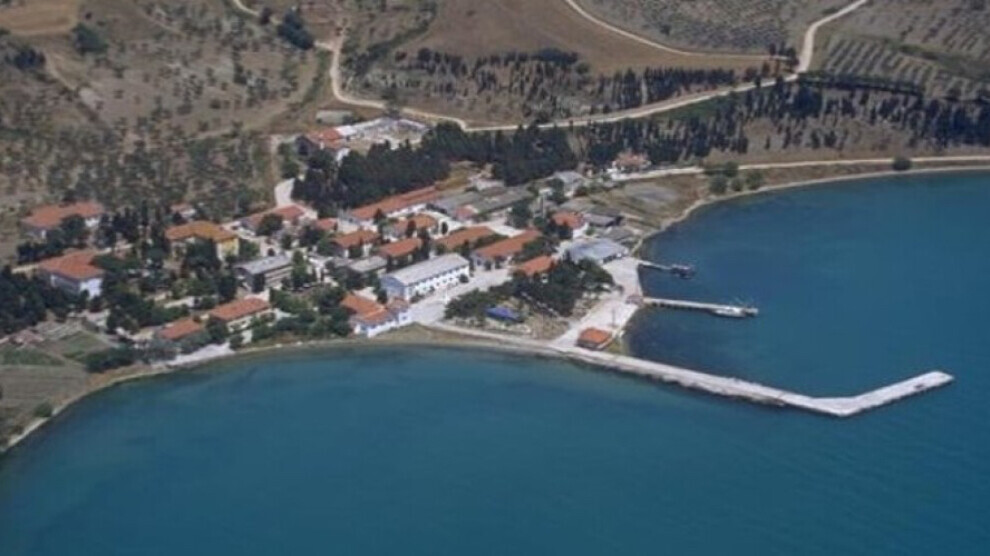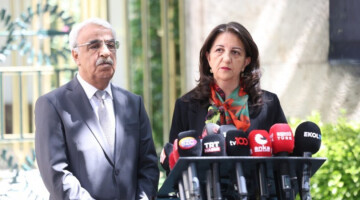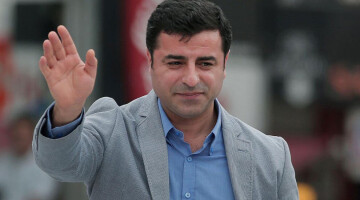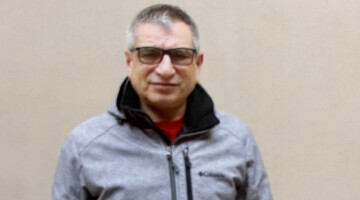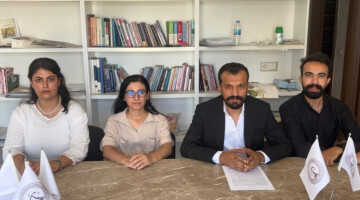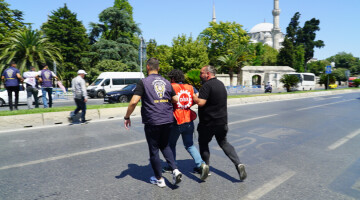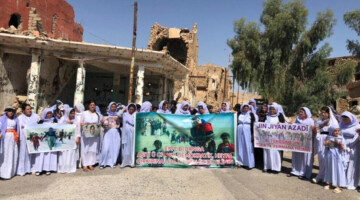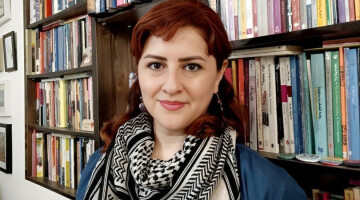Ömer Faruk Hülakü, a lawyer and MP with the Peoples' Equality and Democracy Party (DEM Party), and Ercan Yılmaz, the chairperson of the Amed Branch of the Human Rights Association (IHD), emphasized the necessity of ensuring the physical freedom of Abdullah Öcalan. They said that concrete steps must be taken to enable him to contribute to resolving the Kurdish issue.
Ömer Faruk Hülakü and Ercan Yılmaz stressed that Abdullah Öcalan should be granted physical freedom, benefit from the right to hope, and be released in accordance with the normal functioning of the legal system. They pointed out that the meetings conducted on Imrali Island do not signify the end of isolation.
Hülakü and Yılmaz highlighted that Öcalan's rights to communication, to meet with his lawyers, and family visits remain restricted, and called for an immediate end to his isolation and for his physical freedom to be ensured.
Abdullah Öcalan remains under the isolation
Ömer Faruk Hülakü said: “The discussions held with Mr. Öcalan contain significant proposals for resolving the Kurdish question and are critically important for Turkey’s democratization process. However, for this process to reach a healthy and lasting resolution, it is imperative to safeguard fundamental rights and freedoms and ensure the fair and impartial application of the law. When examined from a national and international legal perspective, the issue of protecting Mr. Öcalan’s fundamental rights highlights several critical points. Firstly, national and international norms such as the Turkish Constitution and the European Convention on Human Rights (ECHR) guarantee the right to a fair trial, as well as the rights to meet with lawyers and family visits to everyone. Yet, the practices on Imrali Island demonstrate clear violations of these basic rights. The obstruction of regular meeting with lawyers and family visits is a blatant violation of both domestic law and international obligations.”
‘The right to hope must be applied immediately’
Faruk Hülakü emphasized the necessity of immediately implementing the "right to hope", and continue: “The ECHR rulings emphasize that even individuals serving life sentences must be granted the right to reassessment and the hope for freedom. In this context, recognizing the ‘right to hope’ for Mr. Öcalan is not only a legal requirement but also a highly significant step that could contribute to the resolution process. As for removing the legal obstacles to his physical freedom, the contribution of such a step to the resolution process is evident from past experiences. Mr. Öcalan’s active involvement in previous peace and dialogue processes had an accelerating and positive impact on those efforts. To enable this, legal procedures must be conducted fairly and transparently. The removal of isolation conditions for Mr. Öcalan would be a significant step toward Turkey’s democratization and the resolution of the Kurdish issue.
This matter is not only about legal fairness but also about achieving societal peace and democracy. The treatment of Mr. Öcalan is also a litmus test of Turkey’s adherence to the rule of law and its compliance with international norms. Upholding the principles of the rule of law and protecting fundamental rights and freedoms will strengthen steps toward resolving the Kurdish issue and lay a crucial foundation for societal peace.”
‘Legislative reforms must be implemented immediately’
Ercan Yılmaz addressed the issue of the right to hope, reminding everyone that it has long been on the agenda of human rights advocates. He noted that the topic gained broader attention in Turkey after Devlet Bahçeli raised the matter in relation to Abdullah Öcalan.
Yılmaz added: “The right to hope, in its simplest form, is the belief that prisoners may one day be released from prison. If a prisoner believes they can reintegrate into society, we can say the right to hope exists. However, if the legal framework suggests that a prisoner can only leave prison upon death, then it is clear that the right to hope does not exist. This is one of Turkey’s fundamental issues.”
Yılmaz also pointed out that the European Court of Human Rights has issued four violation rulings against Turkey regarding the right to hope. He emphasized that the first ruling was issued in 2014 concerning Öcalan. He added that similar rulings were made for Kaytan, Gurban, and Boltan, and stated: “Despite the years that have gone by Turkey has not enacted the necessary legislative reforms to comply with these rulings.”
‘Turkey has still not established regulations on the right to hope’
Yılmaz, referring to the ECHR judgment that the denial of the right to hope constitutes a violation of the prohibition of torture and ill-treatment, stated that from an international law perspective, this situation is often referred to as a “death corridor.” He explained: “The ECHR considers such a penal regime as a form of indirect death penalty. Although you may have abolished the death penalty, keeping prisoners in prison for life, you are effectively applying the death penalty indirectly. During this process, prisoners end up waiting for the passage of time as though they are in a death corridor in the prison.”
Turkey's legal legislation is the main source of the issue
Yılmaz emphasized that Turkey's current legal regulations create conditions for the violation of the right to hope. Pointing to Article 17 of the Anti-Terrorism Law, he said: “This article stipulates that after the abolition of the death penalty, the sentences of prisoners who had been sentenced to death are converted into aggravated life imprisonment. However, the main issue here is that prisoners who receive aggravated life sentences are ordered to remain in prison until the end of their lives. This is in violation of both human rights standards and universal legal principles. The right to hope, discussed in the context of Mr. Abdullah Öcalan, actually concerns thousands of prisoners. There are thousands of prisoners in prison in the context of the Kurdish question. One of the issues raised by the Kurdish question is the situation of those prisoners sentenced to aggravated life imprisonment. If an initiative is to be launched for the resolution of the Kurdish issue, the situation of these prisoners must also be evaluated in accordance with universal legal standards.”
'26 years of isolation is against the law'
Yılmaz said: “It is well known that in many European countries, such a long period is considered sufficient for the execution of the sentence. However, Mr. Öcalan has been in prison por almost 26 years, subjected to severe isolation and solitary confinement during this period. For a very long time, there has been no communication with him, and meetings with lawyers and family members have been denied. Apart from a recent brief contact, whether this isolation will be completely lifted remains a serious question mark in the public’s mind. In this context, it should be reminded that Turkey is obligated to recognize the binding decisions of the ECHR. Taking into account the recommendations of the Committee of Ministers of the Council of Europe and the Committee for the Prevention of Torture (CPT) is a requirement of the international treaties to which Turkey is a party. Recognizing the right to hope through legal regulations is essential, both in terms of aligning with human rights standards and for Turkey to fulfill its obligations under international law.”

